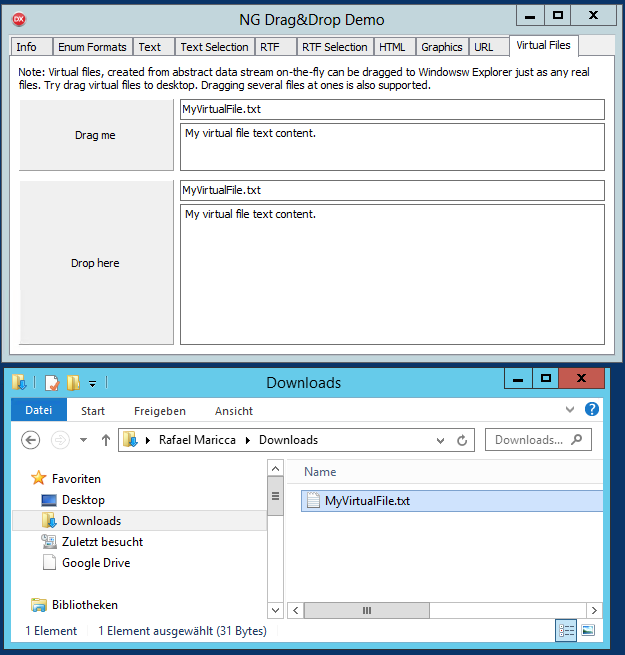Difference between revisions of "LMD NG 2016 - News"
(Created page with "--") |
(→New subscription model and new customer area) |
||
| (13 intermediate revisions by the same user not shown) | |||
| Line 1: | Line 1: | ||
| − | -- | + | {{Head-Getting started}}[[Category:Introduction]] |
| + | |||
| + | == General == | ||
| + | The new Next Generation (NG) Control Suite supplements the LMD line of products for Embarcadero Delphi/C++Builder. While LMD VCL products still (now and in the future) support legacy IDEs (Delphi/C++Builder 6 and higher), NG components make use of new IDE and language features of most recent IDE releases (Delphi/C++Builder 2009 and above). This approach allows us to neglect compatibility issues (e.g. Unicode and Generics support) and to use ideas which are not possible with older IDEs. <br> | ||
| + | Besides that NG Controls are designed to be lightweight and task-focused. They do not represent a complete framework like the LMD VCL platform and can be used at the same time with LMD VCL controls, the VCL (and later FMX) or any other 3rd Party toolbox. | ||
| + | {{Top}} | ||
| + | |||
| + | === Support for IDEs and operating systems === | ||
| + | * Compatible with Delphi and C++ Builder XE2 and better (including new Delphi/C++Builder 10 Seattle). | ||
| + | * Including 64bit support for XE2 and higher! The next Delphi/C++Builder release will be supported almost immediately after public availability. | ||
| + | * Supported IDEs | ||
| + | ** Delphi 2009 and all newer releases (depending on package) | ||
| + | ** C++ Builder 2009 and all newer releases (depending on package) | ||
| + | ** All corresponding Studio Products (CRS 2009, RAD Studio 2010 and all newer releases) | ||
| + | * Supported operating systems | ||
| + | ** Win 2000 or better (including Windows 7/8/10 etc.). | ||
| + | |||
| + | === 64bit support (Delphi XE2 and higher) === | ||
| + | All packages are available in 64bit versions. <br> | ||
| + | {{Top}} | ||
| + | |||
| + | === Reg Utility === | ||
| + | Since 2016 release NG Controls uses same license scheme like LMD VCL product line. This you can review on your machine available licenses for both LMD VCL and NG products via the RegUtility. Since version 2013 RegUtility installer copies all files to the %APPDATA%\LMD Innovative folder (instead of system folder in previous releases). As known from previous releases the new reg utilities recognize earlier license files (regardless whether they are stored in system or appdata folder), so that only one reg utility is required for current and previous licenses.<br> | ||
| + | {{Top}} | ||
| + | |||
| + | === NG 2016 DevUtil === | ||
| + | The NG 2016 DevUtil tool (available for all registered user) was updated (XE6 - Delphi 10 support) and improved. It is now easier than ever to switch between different workspaces (sets of component packages), even leaving the current IDE is no longer required! <br> | ||
| + | {{Top}} | ||
| + | |||
| + | === New subscription model and new customer area === | ||
| + | We received some criticism for our old update policy (especially observing the very fast Embarcadero release cycle and our yearly updates). <br>Old update policy included free minor updates with same major version number - until next major release was available. We offered only for VCL Complete packages subscription models.<br> | ||
| + | Following changes will be introduced with 2016 licenses:<br> | ||
| + | * <i>Each full- or update purchase includes now a one year subscription (<b>free-of-charge</b>)</i><br> | ||
| + | This one-year subscription refers to <b>major version updates</b>. If a new major version is released within subscription period, you'll receive automatically new version free of charge. | ||
| + | * <i>Minor updates with same major version number are handled like before:</i><br> | ||
| + | These updates are always free of charge for all major (products LMD-Tools, ElPack, IDE-Tools, etc.) and standalone packs. These updates are placed in our protected download areas and can be downloaded free of charge - anytime (using your registration utility). | ||
| + | * <i>What happens when subscription expires?</i><br> | ||
| + | Subscription period refers only to the right receiving free <b>major</b> version updates. <br>If your subscription expires, your licenses behaves like before (free minor updates until next major release, perpetual use of the current license). | ||
| + | <br>To reflect new changes we introduced a new [[LMD VCL - New Customer area|customer area]], where customers can review and check license status at one single place. | ||
| + | {{Top}} | ||
| + | |||
| + | == NG HTMLPack == | ||
| + | VCL Styles support. When VCL Styles are enabled and no background/font settings are provided, styled label and background colors are used. <br> | ||
| + | [[Image:htmlPack.png|HTMLPack with VCL Styles support]]<br> | ||
| + | |||
| + | {{Top}} | ||
| + | == NG DialogPack (Delphi 2010 or higher only) == | ||
| + | Full VCL Styles support. The DialogPack demo was revised and allows now (for XE2 and better) to switch between different VCL Styles. | ||
| + | When a VCL Style is activated, dialogs engine switches to emulated mode automatically and shows styled dialogs. This automatic switching can be disabled by setting <code>TNGDialogs.EmulatedVclStyles</code> property to False.<br><br> | ||
| + | <b>Example 1 - Simple TaskDialog (Charcoal Dark Slate)</b><br> | ||
| + | [[Image:dialogpack1.png|Simple TaskDialog (Charcoal Dark Slate)]]<br><br> | ||
| + | <b>Example 2 - ExpandedText demo (Charcoal Dark Slate)</b><br> | ||
| + | [[Image:dialogpack2.png|ExpandedText demo (Charcoal Dark Slate)]]<br><br> | ||
| + | <b>Example 3 - CommandLinks demo (Charcoal Dark Slate)</b><br><br>{{Top}}<br> | ||
| + | [[Image:dialogpack3.png|CommandLinks demo (Charcoal Dark Slate)]]<br><br> | ||
| + | <b>Example 4 - NG InputDialog (Amethyst Kamri)</b><br> | ||
| + | [[Image:dialogpack4.png|NG InputDialog (Amethyst Kamri)]]<br><br> | ||
| + | <b>Example 5 - NG InputDialog with ComboBox (Amethyst Kamri)</b><br> | ||
| + | [[Image:dialogpack5.png|NG InputDialog with ComboBox (Amethyst Kamri)]]<br><br> | ||
| + | <b>Example 6 - HTML Template Sample Dialog (Aqua Graphite)</b><br> | ||
| + | [[Image:dialogpack6.png|HTML Template Sample Dialog (Aqua Graphite)]]<br><br> | ||
| + | {{Top}} | ||
| + | |||
| + | == NG Drag&DropPack (Delphi 2010 or higher only) == | ||
| + | NG Drag&Drop provides the ability to exchange data with other applications via standard Windows OLE drag&drop protocol. There are a lot of common applications, which uses Windows drag&drop: | ||
| + | * Windows Explorer (shell) - allows to drag/receive real or virtual file objects. | ||
| + | * MS Office application (Word, Excel, Outlook, ect), WordPad, other text editors - allows to drag/receive ANSI, Unicode, RTF and HTML text data, images, metafiles, files. | ||
| + | * Internet Browsers (Internet Explorer, Google Chrome, ect) - allows to drag/receive URLs (to open new page or as a bookmark), text (as search query to open new page), files (as downloads). | ||
| + | * Adobe Photoshop - allows to drag/receive images. | ||
| + | * many other high quality Windows applications actually support drag&drop. | ||
| + | <br> | ||
| + | NG Drag&Drop provides Fluent Interface API , which is an easy and very convenient way for supporting drag&drop operations, without placing any component on the form. API supports both source and target parts. For example, data dragging (source part) can be initiated as follows:<br> | ||
| + | <pre class="brush:delphi"> | ||
| + | NGDropSource.AddText('My text') | ||
| + | .AddUnicodeText('My text') | ||
| + | .Execute; | ||
| + | </pre> | ||
| + | <br> | ||
| + | Following is a short feature list of NG Drag&Drop package: | ||
| + | * TNGDropSource component, which allows to drag data from customer's application to any other drag&drop enabled applications. | ||
| + | * TNGDropTarget component, which allows to receive data from any drag&drop enabled application. | ||
| + | * Formal dealing of data formats. Any data drag operation can include any number of formats in dragged data object. There no restrictions of format combinations used. Any drop target as well can be configured to accept any combination of data formats. | ||
| + | * Built-in standard and common formats implementation: | ||
| + | **oCF_TEXT | ||
| + | **oCF_UNICODETEXT | ||
| + | **oCF_BITMAP | ||
| + | **oCF_DIB | ||
| + | **oCF_ENHMETAFILE | ||
| + | **oCF_METAFILEPICT | ||
| + | **oRTF | ||
| + | **oHTML | ||
| + | **oINETURLA (Ansi) | ||
| + | **oINETURLW (Unicode) | ||
| + | **oCF_HDROP | ||
| + | **oFILEDESCRIPTOR | ||
| + | **oFILECONTENTS | ||
| + | * TNGDataFormat base data format class can be subclassed for advanced implementation of complex custom formats. Simple custom formats could be defined declaratively on the top of any existing format class using CustomFormat attribute. | ||
| + | *Data format types shortcuts, such as CF.TEXT for TNGTextFormat, or CF.RTF for TNGRtfFormat. | ||
| + | [[Image:Dragdrop.png|Interaction with Windows Explorer]]<br> | ||
| + | {{Top}} | ||
| + | |||
| + | == Archive == | ||
| + | * [[LMD NG 2015 - News|What's new]] in NG Controls 2015? | ||
Latest revision as of 14:32, 6 September 2015
<< Back to Getting started page
Contents
General
The new Next Generation (NG) Control Suite supplements the LMD line of products for Embarcadero Delphi/C++Builder. While LMD VCL products still (now and in the future) support legacy IDEs (Delphi/C++Builder 6 and higher), NG components make use of new IDE and language features of most recent IDE releases (Delphi/C++Builder 2009 and above). This approach allows us to neglect compatibility issues (e.g. Unicode and Generics support) and to use ideas which are not possible with older IDEs.
Besides that NG Controls are designed to be lightweight and task-focused. They do not represent a complete framework like the LMD VCL platform and can be used at the same time with LMD VCL controls, the VCL (and later FMX) or any other 3rd Party toolbox.
[Top]
Support for IDEs and operating systems
- Compatible with Delphi and C++ Builder XE2 and better (including new Delphi/C++Builder 10 Seattle).
- Including 64bit support for XE2 and higher! The next Delphi/C++Builder release will be supported almost immediately after public availability.
- Supported IDEs
- Delphi 2009 and all newer releases (depending on package)
- C++ Builder 2009 and all newer releases (depending on package)
- All corresponding Studio Products (CRS 2009, RAD Studio 2010 and all newer releases)
- Supported operating systems
- Win 2000 or better (including Windows 7/8/10 etc.).
64bit support (Delphi XE2 and higher)
All packages are available in 64bit versions.
[Top]
Reg Utility
Since 2016 release NG Controls uses same license scheme like LMD VCL product line. This you can review on your machine available licenses for both LMD VCL and NG products via the RegUtility. Since version 2013 RegUtility installer copies all files to the %APPDATA%\LMD Innovative folder (instead of system folder in previous releases). As known from previous releases the new reg utilities recognize earlier license files (regardless whether they are stored in system or appdata folder), so that only one reg utility is required for current and previous licenses.
[Top]
NG 2016 DevUtil
The NG 2016 DevUtil tool (available for all registered user) was updated (XE6 - Delphi 10 support) and improved. It is now easier than ever to switch between different workspaces (sets of component packages), even leaving the current IDE is no longer required!
[Top]
New subscription model and new customer area
We received some criticism for our old update policy (especially observing the very fast Embarcadero release cycle and our yearly updates).
Old update policy included free minor updates with same major version number - until next major release was available. We offered only for VCL Complete packages subscription models.
Following changes will be introduced with 2016 licenses:
- Each full- or update purchase includes now a one year subscription (free-of-charge)
This one-year subscription refers to major version updates. If a new major version is released within subscription period, you'll receive automatically new version free of charge.
- Minor updates with same major version number are handled like before:
These updates are always free of charge for all major (products LMD-Tools, ElPack, IDE-Tools, etc.) and standalone packs. These updates are placed in our protected download areas and can be downloaded free of charge - anytime (using your registration utility).
- What happens when subscription expires?
Subscription period refers only to the right receiving free major version updates.
If your subscription expires, your licenses behaves like before (free minor updates until next major release, perpetual use of the current license).
To reflect new changes we introduced a new customer area, where customers can review and check license status at one single place.
[Top]
NG HTMLPack
VCL Styles support. When VCL Styles are enabled and no background/font settings are provided, styled label and background colors are used.
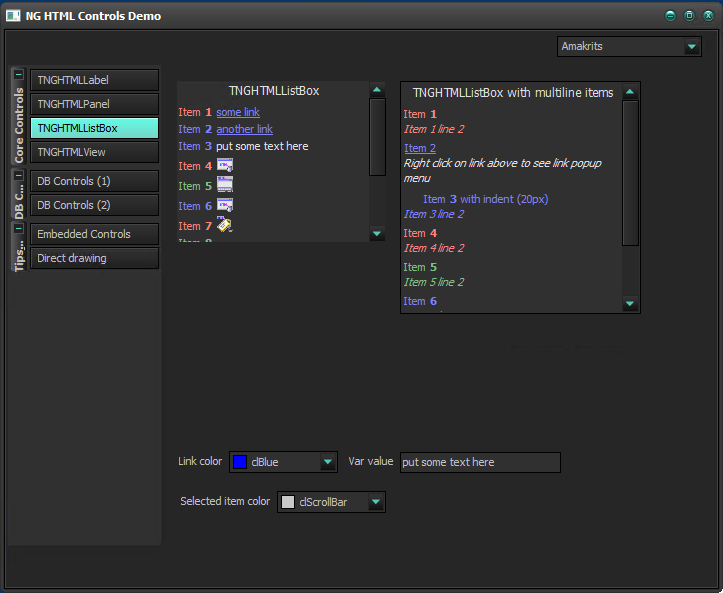
NG DialogPack (Delphi 2010 or higher only)
Full VCL Styles support. The DialogPack demo was revised and allows now (for XE2 and better) to switch between different VCL Styles.
When a VCL Style is activated, dialogs engine switches to emulated mode automatically and shows styled dialogs. This automatic switching can be disabled by setting TNGDialogs.EmulatedVclStyles property to False.
Example 1 - Simple TaskDialog (Charcoal Dark Slate)
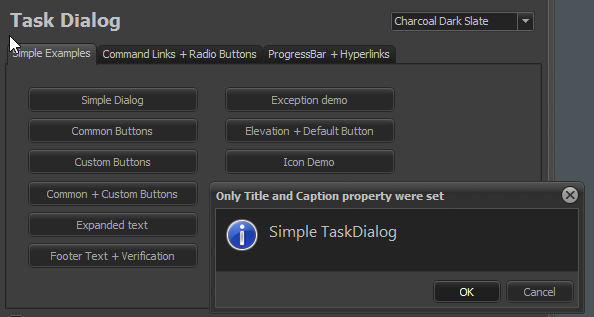
Example 2 - ExpandedText demo (Charcoal Dark Slate)
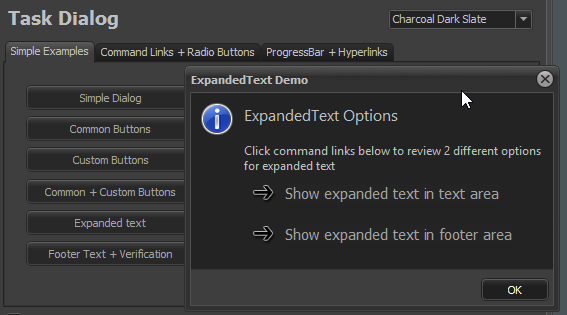
Example 3 - CommandLinks demo (Charcoal Dark Slate)
[Top]
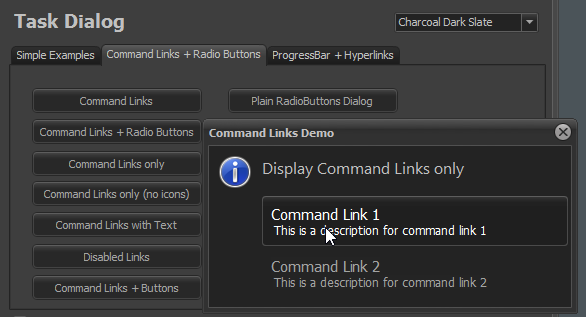
Example 4 - NG InputDialog (Amethyst Kamri)
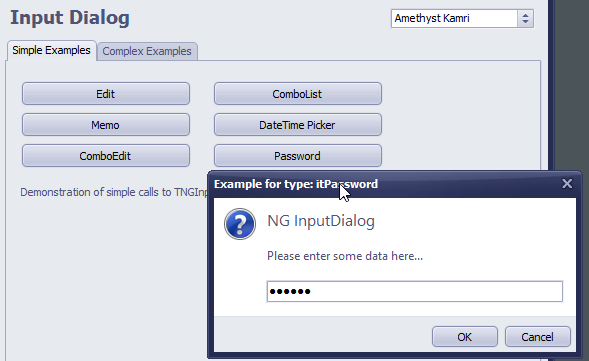
Example 5 - NG InputDialog with ComboBox (Amethyst Kamri)
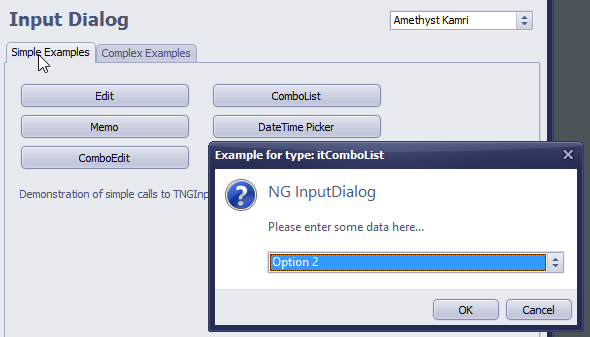
Example 6 - HTML Template Sample Dialog (Aqua Graphite)
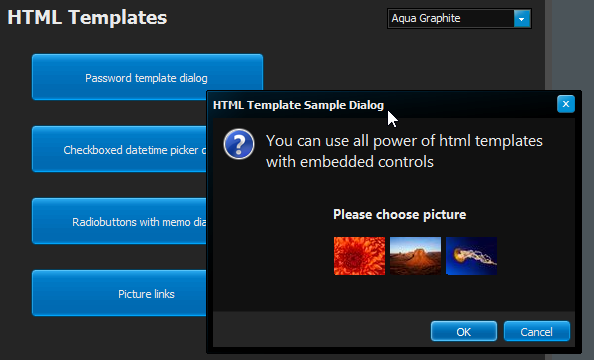
[Top]
NG Drag&DropPack (Delphi 2010 or higher only)
NG Drag&Drop provides the ability to exchange data with other applications via standard Windows OLE drag&drop protocol. There are a lot of common applications, which uses Windows drag&drop:
- Windows Explorer (shell) - allows to drag/receive real or virtual file objects.
- MS Office application (Word, Excel, Outlook, ect), WordPad, other text editors - allows to drag/receive ANSI, Unicode, RTF and HTML text data, images, metafiles, files.
- Internet Browsers (Internet Explorer, Google Chrome, ect) - allows to drag/receive URLs (to open new page or as a bookmark), text (as search query to open new page), files (as downloads).
- Adobe Photoshop - allows to drag/receive images.
- many other high quality Windows applications actually support drag&drop.
NG Drag&Drop provides Fluent Interface API , which is an easy and very convenient way for supporting drag&drop operations, without placing any component on the form. API supports both source and target parts. For example, data dragging (source part) can be initiated as follows:
NGDropSource.AddText('My text')
.AddUnicodeText('My text')
.Execute;
Following is a short feature list of NG Drag&Drop package:
- TNGDropSource component, which allows to drag data from customer's application to any other drag&drop enabled applications.
- TNGDropTarget component, which allows to receive data from any drag&drop enabled application.
- Formal dealing of data formats. Any data drag operation can include any number of formats in dragged data object. There no restrictions of format combinations used. Any drop target as well can be configured to accept any combination of data formats.
- Built-in standard and common formats implementation:
- oCF_TEXT
- oCF_UNICODETEXT
- oCF_BITMAP
- oCF_DIB
- oCF_ENHMETAFILE
- oCF_METAFILEPICT
- oRTF
- oHTML
- oINETURLA (Ansi)
- oINETURLW (Unicode)
- oCF_HDROP
- oFILEDESCRIPTOR
- oFILECONTENTS
- TNGDataFormat base data format class can be subclassed for advanced implementation of complex custom formats. Simple custom formats could be defined declaratively on the top of any existing format class using CustomFormat attribute.
- Data format types shortcuts, such as CF.TEXT for TNGTextFormat, or CF.RTF for TNGRtfFormat.
Archive
- What's new in NG Controls 2015?
